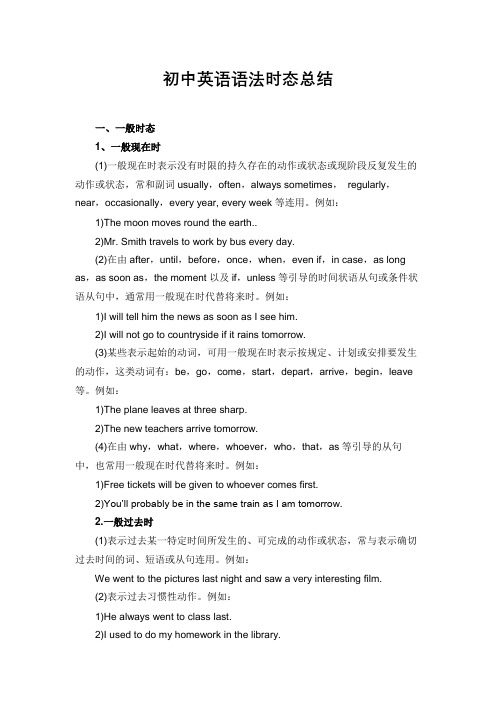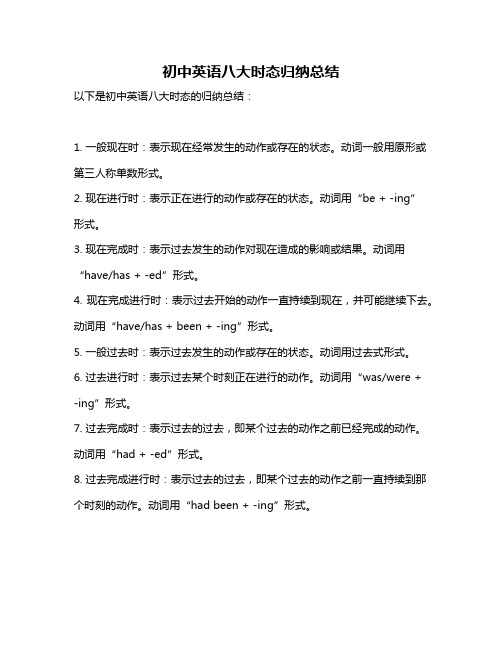初中英语时态
初中英语的八大时态

`:一般现在时英语中的八大时态定义:表示主语反复、经常、习惯性的动作。
句型结构`+V2.实义动词(行为动词)(在肯定句中,在实义动词前加do/does 用来表示强调,以加强句子的语气)2.否定句主语+don’t / doesn't+动词原形+其他3.一般疑问句Do / Does+主语+动词原形+其他4.肯定回答Yes,主语+do / does5.否定回答No,主语+don’t / doesn't用法|1.表示主语的特征或状态。
2.表示客观真理和客观事实。
3.在以when+句子,as soon as+句子,not…until, if+句子的句型中,用主将从现。
4.在以here , there 开头引导的倒装句中,通常采用一般现在时表示正在发生的动作。
时间状语(标志词)1. every+表时间n. on +星期2. 频率副词always usually often sometimes seldom never3. in the moring / afternoon / evening&形式1一般情况下,在动词末尾+s。
2以s x sh ch结尾的动词+es。
3以辅音字母加y结尾的动词,把y改为i 加es。
4以o结尾的单词有生命的+s没生命的加es。
5特殊的be 改为am is are。
&现在进行时定义表示主语的动作正在进行的句子^用法1.表示此时此刻正在进行的动作2.表示现阶段正在进行的动作或持续的状态句型结构1.肯定句:S + am/is/are + Ving2.否定句:S+ am/is/are + not + Ving3.一般疑问句:Am/Is/Are + S + Ving4.肯定回答Yes,S+ am/is/are5.否定回答NO,S + am/is/are + not>形式1如果动词以不发音字母e结尾ie,应先去e加ing2如果动词时只有一个辅音字母结尾的重读闭音节结尾,应双写该辅音字母再加ing3一般情况下,直接加ing时间状语(标志词)Look! Listen! now, at the moment, these days, can you see, can’t you see$注意事项:, come, get, go, have, leave, meet, play, return, see, spend, start, stay, wear, work等词用现在进行时表示将来。
初中英语时态归纳

初中英语时态归纳
初中英语时态主要包括一般现在时、现在进行时、一般过去时和一般将来时。
1. 一般现在时:表示经常性或习惯性动作,常与表示频度的时间状语连用,如always, usually, often, sometimes, every week (day, year, month…), once a week, on Sundays等。
基本结构是be动词(am/is/are)+动词原形。
否定形式是在be动词后加not,疑问句则把be动词放在句首。
2. 现在进行时:表示现阶段或说话时正在进行的动作及行为,常与now, at present, these days等时间状语连用。
基本结构是be 动词+动词的现在分词。
疑问句则把be动词放在句首。
3. 一般过去时:表示过去某个时间里发生的动作或状态,也表示过去习惯性、经常性的动作、行为。
常与表示过去的时间状语连用,如yesterday, last night, the other day等。
基本结构是be动词的过去式或行为动词的过去式。
4. 一般将来时:表示将来要发生的动作或状态,也表示将来经常或反复发生的动作,常与tomorrow, next year等时间状语连用。
基本结构是be动词的将来式或行为动词的将来式。
此外,还有现在完成时和过去完成时等时态。
如需更多信息,建议查阅英语语法书籍或咨询英语老师。
初中英语时态

初中英语时态一、一般现在时一般现在时用于表示经常、反复发生的动作或行为以及现在的某种状况。
常用的时间状语有always。
usually。
often。
sometimes。
every week (day。
year。
month…)。
once aweek(day。
year。
month…),on Sundays等。
基本结构为动词原形,如果主语为第三人称单数,动词上要改为第三人称单数形式。
否定形式为主语+am/is/are +not+其他,行为动词前加don't,第三人称单数用doesn't,同时还原行为动词。
一般疑问句把be动词放于句首,用助动词do提问,第三人称单数用does,同时还原行为动词。
例如:It seldom snows here。
He is always ready to help others。
n XXX.二、一般过去时一般过去时用于表示过去某个时间里发生的动作或状态,以及过去惯性、经常性的动作、行为。
常用的时间状语有ago。
yesterday。
the day before yesterday。
last week,last(year。
night。
month…)。
in 1989.just now。
at the age of 5.one day。
long long ago。
once upon a time等。
基本结构为be动词和行为动词的过去式。
否定形式为主语+was/were +not+其他,在行为动词前加didn't,同时还原行为动词。
一般疑问句was或were放于句首,用助动词do的过去式did提问,同时还原行为动词。
例如:She often came to help us in those days。
I didn't know you wereso busy.三、现在进行时现在进行时用于表示现阶段或说话时正在进行的动作及行为。
常用的时间状语有now。
at this time。
初中英语八种时态整理

一、一般现在时(一)定义表示经常性或习惯性的动作,或存在的状态,还表示主语具备的性格和能力及客观真理。
例:I get up at 6:30 in the morning .She is at home .(二)构成主要用动词原形表示,当主语是第三人称单数时,在动词词尾加s/es。
(三)句型1、肯定句:主语+谓语+其他。
She reads English everyday 。
2、否定句:主语+don’t/doesn’t+谓语+其他.He doesn’t get up at 6:30 in the morning .3、一般疑问句:Do/Does+主语+V原+其他?Do you like English ? Yes ,I do 。
/No, I don't .4、特殊疑问句:特殊疑问词+do/does+主语+V原+其他?What time do you get up every morning ?(四)用法1、表示经常性或习惯性的动作,或存在的状态,带与表示频率的时间状语如:often , sometimes, usually, always,everyday year, month...),once/twice a week (month,year,etc。
), seldom, on Sunday等连用。
I leave home for school at seven every morning .2、表示客观真理,科学事实、格言警句。
The earth goes around the sun 。
地球绕着太阳转。
Ten minus two is eight.十减二等于八。
3、根据英文语法规定,当主句的谓语动词是一般将来时,那么时间或条件状语从句的谓语动词只能用一般现在时来表示将来要发生的动作。
I’ll tell him the news when he comes back. 他回来时,我将告诉他这个消息。
初中所有英语时态

初中英语语法时态总结一、一般时态1、一般现在时(1)一般现在时表示没有时限的持久存在的动作或状态或现阶段反复发生的动作或状态,常和副词usually,often,always sometimes,regularly,near,occasionally,every year, every week等连用。
例如:1)The moon moves round the earth..2)Mr. Smith travels to work by bus every day.(2)在由after,until,before,once,when,even if,in case,as long as,as soon as,the moment以及if,unless等引导的时间状语从句或条件状语从句中,通常用一般现在时代替将来时。
例如:1)I will tell him the news as soon as I see him.2)I will not go to countryside if it rains tomorrow.(3)某些表示起始的动词,可用一般现在时表示按规定、计划或安排要发生的动作,这类动词有:be,go,come,start,depart,arrive,begin,leave 等。
例如:1)The plane leaves at three sharp.2)The new teachers arrive tomorrow.(4)在由why,what,where,whoever,who,that,as等引导的从句中,也常用一般现在时代替将来时。
例如:1)Free tickets will be given to whoever comes first.2)You’ll probably be in the same train as I am tomorrow.2.一般过去时(1)表示过去某一特定时间所发生的、可完成的动作或状态,常与表示确切过去时间的词、短语或从句连用。
初中英语八大时态归纳总结

初中英语八大时态归纳总结
以下是初中英语八大时态的归纳总结:
1. 一般现在时:表示现在经常发生的动作或存在的状态。
动词一般用原形或第三人称单数形式。
2. 现在进行时:表示正在进行的动作或存在的状态。
动词用“be + -ing”
形式。
3. 现在完成时:表示过去发生的动作对现在造成的影响或结果。
动词用“have/has + -ed”形式。
4. 现在完成进行时:表示过去开始的动作一直持续到现在,并可能继续下去。
动词用“have/has + been + -ing”形式。
5. 一般过去时:表示过去发生的动作或存在的状态。
动词用过去式形式。
6. 过去进行时:表示过去某个时刻正在进行的动作。
动词用“was/were + -ing”形式。
7. 过去完成时:表示过去的过去,即某个过去的动作之前已经完成的动作。
动词用“had + -ed”形式。
8. 过去完成进行时:表示过去的过去,即某个过去的动作之前一直持续到那个时刻的动作。
动词用“had been + -ing”形式。
以上是初中英语的八大时态,理解和掌握这些时态对于英语学习和交流非常重要。
初中英语八种时态

初中英语八种时态初中英语中,通常会学习到八种时态:1. 现在简单时态 (Present Simple)- 表示经常性或普遍性的行为、习惯、真理等。
- 例句:I play soccer every weekend.(我每个周末踢足球)2. 过去简单时态 (Past Simple)- 表示过去某个时间发生的动作或状态,常与过去的时间副词连用。
- 例句:Last night, I watched a movie.(昨晚,我看了一部电影)3. 将来简单时态 (Future Simple)- 表示将来发生的动作或状态。
- 例句:I will go to the beach tomorrow.(明天我会去海滩)4. 现在进行时态 (Present Continuous)- 表示现在正在进行的动作。
- 例句:She is studying for her exam.(她正在为考试学习)5. 过去进行时态 (Past Continuous)- 表示过去某个时间正在进行的动作。
- 例句:They were playing basketball when it started raining.(下雨时,他们正在打篮球)6. 将来进行时态 (Future Continuous)- 表示将来某个时间正在进行的动作。
- 例句:This time tomorrow, I will be flying to Paris.(明天这个时候,我将会在飞往巴黎的路上)7. 现在完成时态 (Present Perfect)- 表示过去发生的动作或经历的经验与现在的关系。
- 例句:I have visited Japan twice.(我去过日本两次)8. 过去完成时态 (Past Perfect)- 表示过去某个时间或动作之前已经发生的动作。
- 例句:She had finished her homework before I arrived.(我到之前,她已经完成作业了)这是初中英语中常用的八种时态。
初中英语:八大时态讲解

英语八大时态:一、一般现在时1.表示经常性或习惯性动作,常与表频度的时间状语连用:She often speaks English。
I leave home for school at 7 every morning.造句练习:孩子们通常不喜欢家庭作业.2.表示现在的状态、特征、职业、能力、感觉等:He seems to feel a bit down today。
He works as a driver。
造句练习:她英语说得好。
3.表示真理、客观存在、科学事实或用于格言警句中:Shanghai lies in the east of China。
Columbus proved that the earth is round。
Where there is a will,there is a way。
造句练习:地球绕太阳转动.4.表示现在瞬间的动作:Here comes the bus!5.表示将来1)表按规定、计划、安排将要发生的动作(仅限于某些表示“来、去、动、停、开始、结束、继续”等的趋向动词),可以与表示未来的时间状语搭配使用。
常见的用法是:飞机、火车、轮船、汽车等定期定点运行的交通状况。
如:The next train leaves at 3 o’clock this afternoon.How often does the shuttle bus run?2)在时间和条件状语从句中常使用一般现在时表示将来发生的事情:When Bill comes (不用will come), ask him to wait for me。
I shall go there tomorrow unless I’m too busy。
【练习题】①Nowadays, a large number of women,especially those who from the countryside,___ inthe clothing industry.A.is workingB.worksC.workD.worked②–What would you do if it ___ tomorrow?—-We have to carry it on, since we’ve got everything already.A。
- 1、下载文档前请自行甄别文档内容的完整性,平台不提供额外的编辑、内容补充、找答案等附加服务。
- 2、"仅部分预览"的文档,不可在线预览部分如存在完整性等问题,可反馈申请退款(可完整预览的文档不适用该条件!)。
- 3、如文档侵犯您的权益,请联系客服反馈,我们会尽快为您处理(人工客服工作时间:9:00-18:30)。
英语时态练习1.Nobody ______ how to run this machines. A . know B. have known C. knows D. is knowing2.He____to do his lessons at eight every evening. A. is beginning B. will begin C. begin D. begins3.___your mother____some cleaning on Sundays?A. Does…doesB. Do…doesC. Does…doD. Do…do4. _____ Tom _____to work hard to help his family ? Yes, he _____.A. Has…x…doesB. Has…x…doesC. Does…has…hasD. Does…have…does5.We’ll go to play with snow if it ______ tomorrow. A. snow B. snows C. will snow D. snowed6.I will tell him as soon as he _____ back. A. come B. comes C. will come D. came7. Look ! The boy students are _____ football while the girls are _____ .A. playing…danceB. playing…DancingC. play…dancingD. play…dance8. Mr Smith _____ short stories, but he ____ a TV play these days.A. is writing…is writingB. is writing…writesC. writes…is writingD. writes…writes9. I _____ to the cinema. I ______ there every Sunday.A. go…goB. am going…goC. go…am goingD. am going…am going10. ______ a sports meet last Sunday ? Yes , they ______.A. Did they have...did B. Did they have...had C. Had they...had D. Had they (i)11.They _____ about the TV news then in the sitting-room. They often ____ such talksA. talked…hadB. talk…haveC. were talking…hadD. are talking…have12. I ______ a letter at nine last night. A. is writing B. was writing C. wrote D. is writing13. He ______ some cooking at that time, so he_____ me.A. did…heardB. did…didn't hearC. was doing…heardD. was doing…didn't hear14.The boy_____ English on the radio when I _____ his door.A. learned…was openingB. was learning…openedC. learned…openedD. is learning…open15. He_____a model plane when I came to see him. A. makes B. is making C. was making D. made16. We ______ class meeting this November. A. had B. have C. will have D. are having17. He______in his garden every morning next year. A. will work B. works C. worked D. is working18. Be careful. The train ______. A. will come B. C. comes D. is coming19. Look at those clouds. It _____ soon, I’m afraid.A. is going to rainB. is rainingC. will rainD. won’t rain20. The radio says it ______ the day after tomorrow.A. is going to snowB. is snowingC. will snowD. snows21. _____ he _____ some shopping tomorrow afternoon ?A. Will…doesB. is going to doC. is…doingD. Shall…do22.____you____me up at six, please ?A. Are…going to wakeB. Are…wakingC. Will…wakeD. Do…wake23. Please _____ him that we _____ able to help him.A. tell…will beB. tells…would beC. told…will beD. told…would be24. If he ______ to college, he _____ a lot more.A. will go…will learnB. will go…learnC. is going…is going to learnD. goes…will learn25. When she _____ next time ,l ______ her everything.A. is going to come…shall tellB. will come…shall tellC. comes…will tellD. come…will tell26. She _____that she _____ her best to help them the next term.A. says…will doB. said…will doC. said…would doD. says…would do27. People _____ that the Smiths _____ for a holiday next week.A. say…will goB. said…will goC. said…would goD. say…would go28. Mother ____ me a new coat yesterday, I _____ it on. It fits me well.A. has made…have triedB. made…have triedC. has made…triedD. made…tried29. “He ____ to draw horses already .”“When ____he ?”. “Last year. “A. learned...has B. learned...did C. has learned...has D. has learned (i)30. The Greens _____ China for five years.A. has been inB. have been inC. went toD. has gone to31. _____you _____ the text yet ? Yes, we _____ it two hours ago.A. Did…copy…didB. Have…copied…haveC. Have…copied…didD. Did …copy…had32. _____ you ______ the film before ? Where ____ you _____ it ?A. Have…seen,did...seeB. Did…see,did…seeC. Have…seen,have…seenD. Did…see,have…seen33. You _____ me waiting for two hours. I _____ for you since five.A. Kept…waitedB. have kept…waitedC. kept…have waitedD. have kept…have waited34. Where _____John _____? To the library. He _____ there for an hour.A. has…been, has goneB. has…gone, has beenC. did…go, wentD. did…be, went35. _____ you ever _____America ? Yes, I have.A. Have…gone toB. Have…gone inC. Have…been toD. Have…been in36. By the time I _____ back they ____ up ten meters.A. came…have climbedB. came…had climbedC. come…have climbedD. had come…climbed37. I _____ him a second letter before I _____ from him.A. wrote…heardB. wrote…had heardC. had written…heardD. have written…hear38. They ____for five hours when they ____ in New York.A. flew…arrivedB. had flown…had arrivedC. flew…had arrivedD. had flown…arrived39. She ____ that it ____ for two days by that day.A. says…has rainedB. says…had rainedC. said…had rainedD. said…rained40. John _____ there since the year before, so he ____ them.A. had worked…knewB. had worked….had knownC. worked…knewD. worked…had known’。
